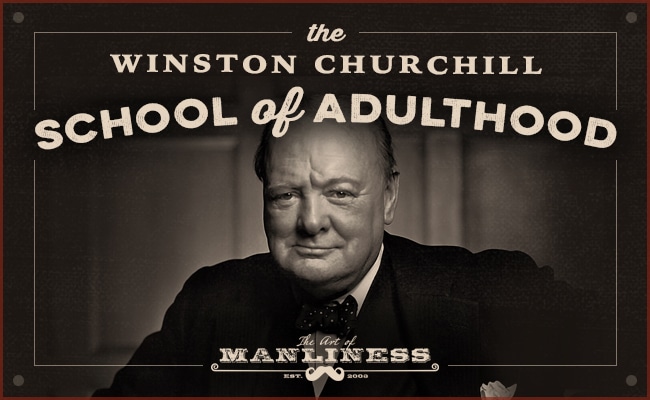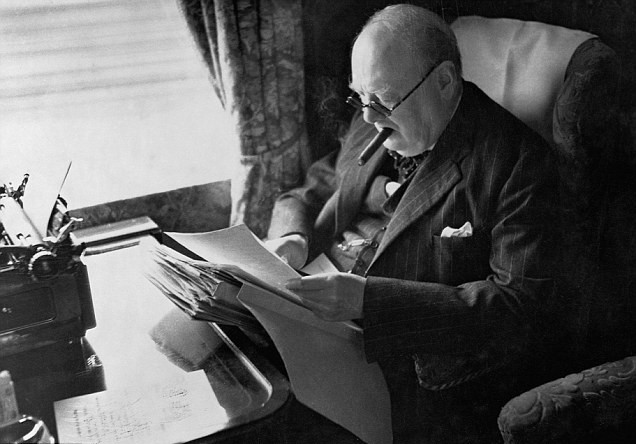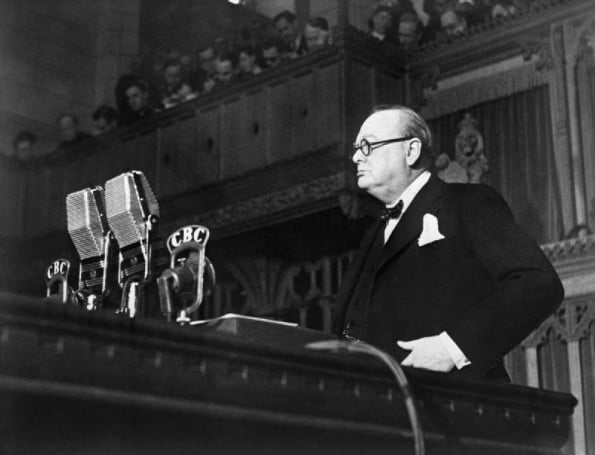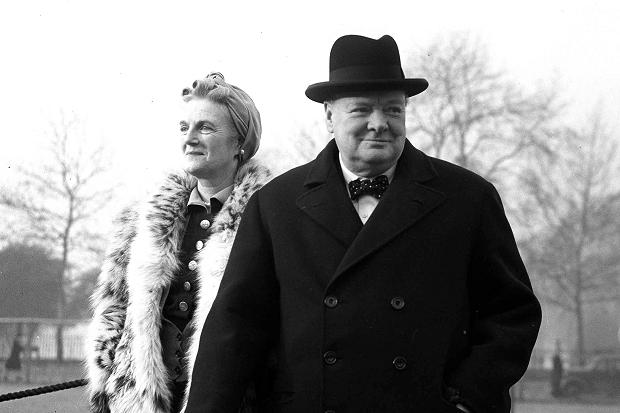
“If ever there was a Renaissance man, he was it. In the age of the specialist, he was the antithesis, our Leonardo. As a writer he was a reporter, novelist, essayist, critic, historian, and biographer. As a statesman he served, before becoming His Majesty’s first magistrate, as minister for the colonies and for trade, home affairs, finance, and all three of the armed forces. Away from his desk he was at various times an airplane pilot, artist, farmer, fencer, hunter, breeder of racehorses, polo player, collector of tropical fish, and shooter of wild animals in Africa. One felt he could do anything.” –William Manchester, The Last Lion
Churchill’s energy, industry, and insatiable appetite for living formed one of the most noteworthy aspects of his character. Friends and colleagues described him as “incapable of inactivity,” and observed that “Winston has so many irons in the fire that the day is not nearly long enough.” There were indeed periods of Churchill’s life where he could accurately report “I never had a dull or idle moment from morning till midnight.”
For Churchill, Manchester writes, “boredom was an enemy to be vanquished.” Being bored put Winston in an incredibly foul mood, as he saw such a state as a waste of the precious and limited time of his mortality. If he found himself in a stultifying situation, he would quickly break away to engage in something more stimulating. As Manchester writes, “In relief of boredom, almost any action—short of the wicked—would do, with one prerequisite: it had to possess value, and Churchill was the arbiter of the value.”
While we often think of “fun” as the opposite of “boredom,” Churchill attacked and vanquished the doldrums of adulthood on a wide variety of fronts — from challenging work to heavy responsibilities to stimulating hobbies. He was in fact the very embodiment of artist Constantin Brancuși’s maxim that to live a fulfilling, flourishing life, one must “Work like a slave; command like a king; create like a god.”
Work Like a Slave

While Churchill is frequently pictured in the public imagination as a lackadaisical lie-about – staying up late, lounging in bed well into the morning, napping in the afternoon – he was in fact an unflagging workhorse. Despite the idiosyncrasies of his daily routine, he still managed to spend 8-9 hours a day “on the job” – and worked on the weekends and during his vacations as well.
Serving in the House of Commons was not a paying gig, and his writing career thus served as his sole source of income for most of his life. Meeting his financial obligations therefore meant turning out an endless stream of literature. In the 1930s alone, for example, he published 11 books and over 400 articles, while at the same time working on his 1,700-page History of the English-Speaking Peoples – a monumental task that left his desk covered with towering stacks of research notes.
Churchill’s prodigious writing output had to be fit into a schedule already crowded with hobbies, family time, and Parliamentary duties (he gave nearly 400 during the 1930s alone). After reading the fourth volume of Churchill’s million-word biography on the Duke of Marlborough, a friend wrote Winston: “It is incredible to me that one man can possess the genius to write a book like this and at the same time pursue his ordinary life which is a thousand times fuller of grave duties and obligations than that of lesser men.”
Certainly it wasn’t an easy balance; during the busier times of his life when book and article deadlines loomed, Churchill’s work schedule would expand to herculean lengths and keep him up past his already late bedtime. Many a night found him in his study laboring ‘til 4 in the morning, only to wake up at 8am to begin all over again. It could be, Churchill admitted, “a formidable grind.”
The pressures of World War II would demand a similarly punishing schedule. Churchill often worked a 16-17-hour day that was broken only by his sacrosanct afternoon nap. Captain Richard Pim, head of the Admiralty’s War Room, recalled Churchill’s astonishing capacity for industry:
“I had always heard that he was an indefatigable worker and there is no other word to describe his activities. His day started with a visit in his multi-coloured dressing gown to the War Room generally soon after seven—although often it was a far earlier hour…. With the exception of about two hours’ rest each afternoon he continued hard at it with a short respite for meals until one or two o’clock next morning when he used to pay us a final visit on his way to bed.”
Despite the highly demanding nature of Churchill’s work, he largely found his toil to be immensely satisfying. He loved matching wits in Parliament with his fellow MPs and was exhilarated by the task of plotting victory against Germany. As Manchester details, writing offered Winston a great deal of fulfillment as well:
“To an exceptional degree he enjoyed writing and was even invigorated by it. Few writers of depth are actually exhilarated by creativity; it drains them; at the end of a session most are exhausted. In many ways he was an exception. ‘Writing a long and substantial book,’ he said, ‘is like having a friend and companion at your side, to whom you can always turn for comfort and amusement, and whose society becomes more attractive as a new and widening field of interest is lighted in your mind.’ His letters seem to reflect the excitement of a writer rejoicing in the power of his inimitable style; to Clementine, skiing in Austria, he wrote: ‘The days pass quickly for I have so much to do.’”
Ultimately, the most satisfying element of all the hours Churchill invested in his work was the incredible legacy they produced: 44 books written, over one thousand articles penned, millions of words of oratory spoken, and a world made safe for democracy.
Command Like a King

After Churchill was officially asked by King George VI to head Her Majesty’s Government (as is tradition before the new prime minister assumes the position), he silently rode back home with his friend and bodyguard W.H. Thompson. As Churchill got out of the car, he turned to the former Scotland Yard detective and asked: “You know why I have been to Buckingham Palace, Thompson?” His companion affirmed that he did, and added, “I only wish the position had come your way in better times, for you have an enormous task.” Churchill’s eyes filled with tears as he replied, “God alone knows how great it is. I hope that it is not too late. I am very much afraid that it is. We can only do our best.”
Later that night, the iron resolution for which Churchill would be known for throughout the war had settled through his soul. He remembered his thoughts on that historic night:
“As I went to bed at about 3 A.M., I was conscious of a profound sense of relief. At last I had the authority to give directions over the whole scene…
I felt as if I were walking with Destiny, and that all my past life had been but a preparation for this hour and for this trial. Eleven years in the political wilderness had freed me from ordinary party antagonisms. My warnings over the last six years had been so numerous, so detailed, and were now so terribly vindicated, that no one could gainsay me. I could not be reproached either for making the war or with want of preparation for it…Therefore, although impatient for the morning, I slept soundly and had no need for cheering dreams. Facts are better than dreams.”
It may seem strange that a man might feel relieved at the prospect of taking charge of a country precariously standing as Europe’s last bulwark against the spread of Nazism. But just as Churchill didn’t shy away from hard work, he didn’t run from the weight of responsibility either. Instead it was a burden he eagerly sought, even relished. Churchill understood that responsibility is just another word for power – the power to change things, to alter the course of human events.
Beginning as a young man, Churchill was incredibly ambitious to rise in the ranks of government. His ambition was in fact so brazen and naked, that some found it off-putting. But while he was indeed after glory, honor, and excitement, and loved public adulation and applause, he was also driven by the belief that he truly had something to offer his country. As Manchester writes, “He knew his worth, and suffered when he saw mediocrities, men without imagination, vision, or honor, betraying his England.” He longed to be in the “cockpit of action” — to be able to actively steer his nation on what he felt was the right course. Thus when he finally found himself at the helm, rather than being overwhelmed by the daunting task ahead of him, he rejoiced in at last having the ability to bring his ideas to fruition. Being on the outside looking in, left to rail against the blunders of others – that was the real burden.

So it was that Churchill felt invigorated, rather then stressed, to find himself in the driver’s seat. As an American journalist observed, though Winston was 65 years old, he was filled with boundless energy:
“The responsibilities which are his now must be greater than those carried by any other human being on earth. One would think such a weight would have a crushing effect upon him. Not at all. The last time I saw him, while the Battle of Britain was still raging, he looked twenty years younger than before the war began.”
That last statement gets at the heart of Churchill’s efficacy as a leader; in “commanding like a king,” he didn’t have to browbeat his subordinates and strong-arm his countrymen into doing what was necessary, but instead was able to get them to buy into his vision themselves.
In his inner circle, he could sometimes be overbearing and short with his assistants, and yet all felt it was a privilege to work with him and wanted to give him their best. His chief researcher described the powerful pull of his magnetism: “One felt exhilarated…And he communicated it. You were absolutely a part of it—swept into it.” And his secretary painted an evocative picture of the atmosphere inside Chartwell when Churchill was working at home: “I had never been in a house like that. It was alive, restless. When he went away it was still as a mouse. When he was there it was vibrating.”
The public was equally electrified by his vision. From his youth onwards, he had been fascinated by words, and over the years had become absolute master over them. Language in his hands became both a potent weapon and a palette of paints. Through his speeches and radio broadcasts, he entered into his countrymen’s homes and hearts, and inspired them to continue to sacrifice and to fight on. He knew how to craft and weave together phrases that could reach every class of people, and he sought not to tell them how to feel, but to give expression to the noble sentiments already in their hearts.
The most potent source of the resonance of Churchill’s rhetoric, however, was his absolute sincerity. He didn’t spare his countrymen from the hard truths of what was happening, and he didn’t spare himself from the dangers they collectively faced either; in everything, they were in it together. “Before he can inspire them with any emotion he must be swayed by it himself,” Churchill said of the effective speaker. “Before he can move their tears his own must flow. To convince them he must himself believe.”
Churchill believed, and so his people willingly followed him through hell.
Create Like a God

Given the number of Churchill’s working hours, and the weight of his responsibilities, one might think he’d need ample “vegging out” time to restore his equilibrium. He did indeed pause each day to nap, and to sit by the pond on his property, doing nothing more than puffing on a cigar and feeding his ducks. But he also believed that partaking in more activities, as long as they were different from one’s central work, was actually the surest path to rejuvenation:
“Change is the master key. A man can wear out a particular part of his mind by continually using it and tiring it…the tired parts of the mind can be rested and strengthened, not merely by rest, but by using other parts. It is not enough merely to switch off the lights which play upon the main and ordinary field of interest; a new field of interest must be illuminated…It is only when new cells are called into activity, when new stars become lords of the ascendant, that relief, repose, refreshment are afforded…
The cultivation of a hobby and new forms of interest is therefore a policy of first importance to a public man…To be really happy and really safe, one ought to have at least two or three hobbies, and they must all be real.”
Churchill himself had more than 2 or 3 hobbies; he enjoyed card games, listening to music, tending to his goldfish, and especially reading. But he felt that psychic equilibrium was best restored by calling “into use those parts of the mind which direct both eye and hand.” To that end he took up bricklaying, landscaping, and painting as pastimes.

When Churchill first bought Chartwell, the grounds were overgrown and the home in need of much refurbishing. Over the years, Churchill fixed up and expanded the house, constructed several new buildings on the property, created ponds, added a waterfall and island to the lake, planted orchards and gardens, and laid the bricks for the walls around them — all with his own hands.
Painting provided Churchill an opportunity to use his hands in a more refined way. He created 500 canvases, won critical praise for his talent, and displayed his works at the British Royal Academy. But he was most grateful for the effect painting had on his psyche; its mixture of focus and flow proved a most necessary outlet for the many stresses of his life. “If it weren’t for painting,” he said, “I couldn’t live. I couldn’t bear the strain of things.”
One would be remiss to move on from a section about creation, without mentioning the intangible things Churchill also brought to life. As discussed throughout this series, he created a narrative for his life, and an atmosphere and mood in his day-to-day doings to match it. He created a loving marriage, affectionate bonds with his children, and a roundtable of loyal friends; one of the activities that was most necessary to his rejuvenation was socializing with those he cared for, and who cared for him.

Finally, as his fellow Member of Parliament, A.P. Herbert put it, Churchill was a man “who, at any time, in any conditions, in any company, on any subject, with never a fault of taste or tact, can make laughter when he wills.” He could create an unmatched attitude of fun and humor in any situation, and he never took himself, or others, too seriously. In this, he was of course the creator of some of the wittiest quips of all time. My favorite, for obvious reasons, concerns the nascent mustache he tried to grow as a young 20-something cavalryman. When a friend of his mother’s told him she liked neither his mustache, nor his politics, Winston replied, “Madame, I see no earthly reason why you should come in contact with either.”
While we have been including the takeaways of each lesson at the end of each article, because of the length and importance of this one, the takeaways will be run tomorrow as a separate piece. Stay tuned!
Read the Entire Series
The Winston Churchill School of Adulthood Is Now in Session
A Prerequisite Class on Becoming the Author of Your Own Life
Lesson #1: Develop a Mighty Moral Code
Lesson #2: Establish a Daily Routine
Lesson #3: Live Romantically
Lesson #4: Cultivate a Nostalgic Love for History
Lesson #5: Don’t Give Up Your Sense of Adventure
Lesson #6: Don’t Be Afraid to Start a Family
Tips on Hustling, Leadership, and Hobbies from Winston Churchill
Conclusion: Thought + Action = An Awesome Adulthood
_________________________________________
Sources:
The Last Lion Trilogy by William Manchester
“Painting as a Pastime” by Winston Churchill
Tags: Winston Churchill


